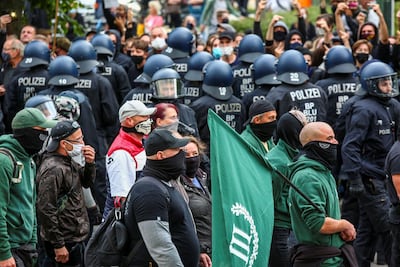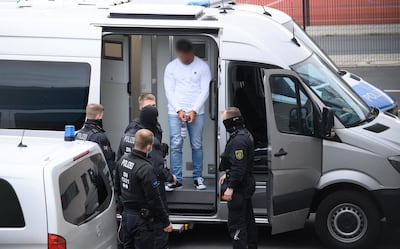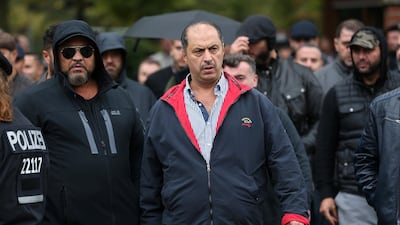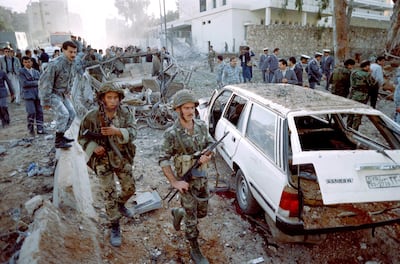The chaotic departure from Germany of Berlin’s self-styled criminal Godfather, Mahmoud Al Zein, was a landmark moment in the fight against ethnic crime clans that dominated the city for decades.
Middle East-dominated gangs – headed by figures like Al Zein - were responsible for a crime every eight hours in Berlin in 2020. The rap sheet includes five killings, multiple cases of fraud and systemic violations of Covid-19 lockdown rules, figures published by the authorities this week detailed.
The violent nature of clan crime, as well as its scale, has become entangled in the fierce debate over the integration of migrants in Germany. Political arguments over how best to take on the gangs is a hot button issue as the German capital prepares for regional elections later this year.
Al Zein claimed he was born in Beirut - apparently falsely - and travelled to Germany in 1982. Known as ‘The Fat Man’ by investigators, he successfully avoided several deportation attempts as he built his criminal empire steeped in violence and based on cultural and ethnic loyalties.
That career came to an end in January when he departed for Turkey to avoid enforced deportation by Germany's immigration authorities.
After a year of police raids, Berlin’s ruling Social Democratic Party hailed Al Zein’s departure as one of the most visible signs that their ‘pinprick’ strategy of targeting and harassing the syndicates was working.
When he left Germany for good he was accompanied to the airport by a coterie of flunkies. They sent barriers flying as they tried to stop a camera crew from Der Spiegel newspaper filming the departure of the man who epitomised the power of Kurdish and Arab clans.
“When fighting clan crime, I spoke of a marathon,” said Andreas Geisel, Berlin’s interior minister. “We are still at the beginning, but have now found our running rhythm …. in Berlin, the same law applies to everyone. And we are determined to enforce this.”
He said the departure of Al Zein was a milestone. “It is only one person but it is a special person,” he said. “It shows our determination – this is a signal.”
In a series of articles, The National will focus on the activities of the groups that hail from North Africa and the Middle East but have continued to operate outside of local laws, customs and with their own system of parallel justice. Their presence has become such a part of Berlin life that there are tours dedicated to them.
Authorities estimate that crime in Berlin is controlled by about 20 influential families, with seven or eight of them highly active. The problems have caused schisms in German society that leaders fear will be amplified after an influx of hundreds of thousands of people in 2015 fleeing war and poverty.
The rising popularity of far-right parties focused the minds of state governments, some of which failed to tackle the gangs for fear of being seen as racist, experts said.
The Berlin government put in place a five-point plan in 2018 to tackle crime gangs, increasing the numbers of prosecutions and pursuing their assets. Now, the problem of the Arab crime gangs is to feature in the battle for control of Berlin’s city hall at forthcoming elections.
Cutting the age of criminal consent to combat gangs
A Berlin action plan drawn up by Chancellor Angela Merkel's CDU party, which is in opposition in the capital, proposed drastic measures in a bid to curb the gang powers, including cutting the criminal age of consent to 12 from 14 to prevent children being used as drug runners.
In 2020, one child aged under 14 was responsible for more than five crimes, according to Berlin police statistics.
The CDU called for children of criminal leaders to be removed from their families to punish gangs with a history of familial succession.
The clan structure is dominated by Lebanese groups, Iraqi Kurds and Turkish families with the head of a family at its heart. Some have several thousand members in Berlin alone while others have just a few hundred.
About 156,000 people in Berlin are connected to Arab migrants, making up about four per cent of the city’s population. Only a third of those have German nationality.
“These clans are based on closed family structures with strong internal loyalties,” a government-commissioned report said.
Members include the descendants of the 14 million foreign workers who flocked to help rebuild Germany in the aftermath of the Second World War.
West Germany needed labour for its booming economy and struck a series of agreements with countries including Morocco, Turkey and Tunisia in the 1960s.
A second wave of migrants requesting political asylum during the Lebanese civil war saw the migrant population in West Berlin surge from 100,000 in 1980 to more than 400,000 by 1992.
A backlash against the new arrivals in the 1980s led to cuts in social benefits and barriers to work as authorities failed to invest in immigrants' futures, convinced that they would return home. Kurds – repressed in Turkey and Lebanon – suffered the same fate.
Many turned to crime to make ends meet. One former gang member who arrived in the 1980s claimed 90 per cent of refugees in Berlin were forced to sell drugs and stolen goods.
The migrants faced resentment from the local population and police were able to provide only limited protection from arson attacks led by neo-Nazis. Migrants formed self-protection units to defend their homes with baseball bats.

“Political mistakes have clearly been made,” said Tom Schreiber, a Berlin politician who drew up plans to tackle the clans for the ruling Social Democrat party in Berlin. “And they threaten to repeat themselves.”
Researchers reported that newly-arrived Syrian and Iraqi families rallied together to defend themselves against protection rackets run by Lebanese groups, who are resentful of improved residency conditions for new arrivals.
“They say: ‘why did you neglect us for decades and the Syrians get everything’?” said Prof Mathias Rohe, who wrote an influential 2015 study.
State government afraid to confront clans
His report said that the state government was “shying away” from confronting clans in some Arab-dominated neighbourhoods of Berlin.
“There is a climate of fear if even only the names of clan members are mentioned,” it said.
The report, based in part on interviews with clan leaders and members, said that the state left the groups to resolve their internal disputes – sometimes with extreme violence.
“The Italian Mafia fights with the foil and clan fights with the machete,” Mr Schreiber said.
Failure to tackle the gangs led to a climate of impunity that encouraged criminals to commit more extreme operations and flaunt ill-gotten gains without fear of reprisal.
The Arab gangs were the most visible among criminal syndicates as they competed with rival clans over their levels of success, said Ahmad Omeirate, an economist who researches Arab clans.
The Berlin police report published this week identified 388 people involved in Arab clan crime, nearly half of them Germans and about 18 per cent with Lebanese nationality. Turks make up another six per cent while the nationality of 16 per cent is unknown or unclear - adding to the problems for potential deportation.
The figures show that in 2020, a total of 1,013 so-called clan crimes were committed by 291 suspects. The most common were traffic, drugs, stealing and violent crime. The most prolific criminals were aged between 18 and 25.
One 23-year-old Syrian was identified as the most prolific after carrying out 48 crimes in 2020 and linked to more than 170 in the last five years.
They want to be as wealthy as Russian and Vietnamese gangs but “as famous as movie stars”, Mr Omeirate said.
“They put their cars on Instagram and their watches, like Rolexes. It’s a competition between groups. When they see a Lamborghini, they need a better car, a more expensive car to say 'I’m richer than you.'”
The first generation of gangs focused on drug-smuggling, protection rackets and prostitution. Their offspring – born and raised within the clan culture – added spectacular raids on museums, shops and casinos to their repertoire.
They included the robbery of 18th century jewels, worth an estimated $1 billion, from Dresden's Green Vault Museum in 2019. It was the biggest heist in Germany's post-Second World War history.
A 100-kilogram Canadian gold coin worth $4.4 million was stolen from Berlin's Bode Museum.
Politicians were prompted to act by a series of events including a clan-related shooting in Charlottenburg – a so-called ‘good’ part of town, highlighting how violent crime did not affect only immigrant communities.
Gangland murder sparked calls for firmer action
The murder of a gangland enforcer in a Berlin park crowded with families in 2018 sparked by a turf war between rival gangs and led to demands for a stronger political response.
About 2,000 people turned up to the funeral of the victim, Nidal Rabih, including some of the country’s best-known crime bosses. The portly Al Zein was among them, wearing a bomber jacket and surrounded by men in hoodies.
Al Zein considered himself above the law and wrote a book that made no secret of his significance in the German underworld: The Godfather of Berlin: My Way, My Family, My Rules.
He exploited a culture where criminal ruthlessness was valued over productive employment. Al Zein “is nobody – but for the boys, he will be revered as a president,” a political scientist interviewed for Prof Rohe's 2015 report said.

German authorities were finally able to deport him after unravelling his complex past and discovering he was Turkish and not Lebanese, as he had claimed. Experts said attempts to deport gang members are often complicated by suspects avoiding holding identity documents that identify their nationality.
Another clan boss, Ibrahim Miri, was sent back to Lebanon twice from his home base in Bremen in 2019 after living for years in Germany.
“This caused huge debates in the clan because some of them thought they were untouchable,” Prof Rohe said.
The pursuit of Al Zein was part of the zero-tolerance approach by Berlin’s police that featured surveillance and raids of shisha bars, cafes, properties and barber shops connected to the gangs. Police in 2020 seized 91 weapons and 78 cars.

But Mr Omeirate said the police campaign had only limited success as the gangs were entrenched in Berlin society and had moved some of their assets into legitimate enterprises.
“It’s not really working,” he said. “They might be doing this in Berlin and in some other cities but they just move to other cities and do their job there.”
Prof Rohe said the authorities improved their efforts significantly but there were still major problems in tracing the profits of their illegitimate crimes.
“These people are often very intelligent, at least the leaders,” he said. “They launder their money by buying hotels and other bits of real estate in western Turkey, Sweden and other parts of the world. It’s extremely difficult to trace that back.”


